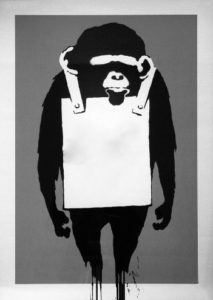Retail Scanner
Battle of the Banksy trade marks
August 2021
Between 2014 and 2019 Banksy applied and registered 14 European Union trade marks for some of his most famous artworks. However, over the last 2 years several of these registrations have been subject to invalidity actions filed by Full Colour Black Limited, a greetings card company.
Background
Banksy creates new graffiti artwork sporadically throughout the UK and there is general excitement within the public when a new artwork appears. Buildings which are chosen as the location suddenly shoot up in value overnight, visitors flock to see the new artwork and there have even been instances of attempts to remove the artwork as they are considered to be valuable.
Part of what adds to Banksy’s appeal is the fact he remains anonymous. There is much speculation over his identity, but no one really knows. This anonymity adds complexity to his intellectual property rights and the ability to assert those rights.
Historically, Banksy has been unable to rely on copyright claims as he is not willing to disclose his identity. In order to be able to rely on copyright, he would need to be able to assert that he is the artist who created the works. Having said this, such claims against third parties by Banksy seem to be rare.
In addition, Banksy has been relatively vocal about his lack of interest in intellectual property rights and has even stated that ‘copyright is for losers’, presumably because he is unable to rely on it and stay anonymous. He is now trying to take advantage of the trade mark system in order to protect his works.
Current actions at the EUIPO
A quick search on the European Union Intellectual Property Office (EUIPO) website shows there are currently 17 trade mark registrations in the name of Pest Control Office Limited, which is Banksy’s corporate body.
In order to circumvent the need to disclose his identity in order to rely on copyright, Banksy has registered several trade marks at the EUIPO for a number of his works.
The works that have been filed include ‘Flower Thrower’, ‘Laugh now’ and ‘Bomb Hugger’ and cover a range of goods such as paints, sunglasses, stationery and clothing.

Flower Thrower

Laugh now

Bomb Hugger
In 2019, greetings card company Full Colour Black Limited (FCB) filed invalidity actions against the registrations on several grounds, including bad faith.
The ongoing dispute circles around the fact that Banksy is trying to circumvent the requirements of copyright law and obtain a monopoly right, which can be renewed indefinitely and is easier to enforce against third parties. FCB have argued that Banksy/Pest Control Limited never had a genuine intention to use the works as trade marks and previously actively encouraged third parties to use the works as they wished. On this basis FCB argued the marks were filed in bad faith.
As a retort to the claims made by FCB, Banksy opened a retail outlet in London called Gross Domestic Product where items were available for sale, but they had to be purchased online. He publicly stated that the sole purpose of the shop was to satisfy the requirements for the trade marks, to show he was using the marks in the course of trade.
The first decision in relation to ‘Flower Thrower’ was handed down in September 2020, where FCB were successful on all grounds. It was held that the mark had been registered in bad faith. More recently, in June 2021 another decision has followed also stating that the ‘Bomb Hugger’ registration was filed in bad faith and has also been fully cancelled.
Retail drive for Full Colour Black
The main drive behind FCB’s actions in filing the invalidity actions is purely commercial. FCB’s main unique selling point is the fact they sell street art greetings cards, so for them to be able to use the Banksy images directly impacts their sales offering, given Banksy’s fame and popularity. Normally, FCB would need to ensure they had the proper authorisation from the rights holder (in this case, the artists) in order to reproduce their works for commercial gain.
However, Banksy himself takes a laissez faire attitude towards IP rights and has been vocal about it. Likewise, FCB are taking a tongue in cheek attitude toward the matter and includes a comment on the back of the Banksy cards stating that royalties from sales will be accumulated and then donated to a charity unless Banksy decides to reveal himself.
If the trade marks remained registered, Banksy would have been able to prevent FCB from using the artworks which were registered, as such use would have amounted to trade mark infringement.
Conclusion
Ultimately it appears that Banksy’s attitude has slowly changed with respect to intellectual property rights, once very tolerant of others using his artworks he now appears to be taking a stance against other’s commercial gain from his works. It is frustrating from his perspective as he in unable to remain anonymous and enforce his copyright however trade marks are not quite the right fit for protection of his artworks as he simply doesn’t use them as an indication of origin for goods or services.
Based on the two decisions handed down by the EUIPO to date, it is expected that further decisions will follow the same reasoning. Going forward, if Banksy wants to take control of the unauthorised exploitation of his works in future, he will need to rely on copyright, expose his true identity and potentially lose some of his artistic appeal.

This article was prepared by HGF Trade Mark Attorney Rachel Platts.































